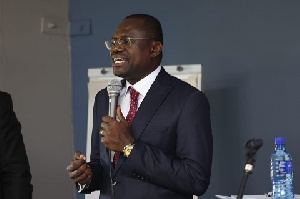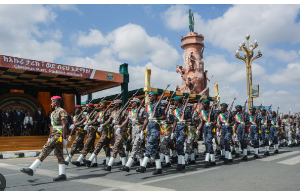Great power rivalry amongst Washington, Moscow and Beijing would seem to be intensifying, reaching a crescendo lately in the wake of the Russia and Ukraine war. Washington’s quest to gain more influence ahead of a possible face-off with China should be seen as one of the reasons why Kamala Harris is touring Africa.
China is America’s leading rival and competitor in Africa and for Africa in terms of influence and investment. These two powerful members of the UN Security Council miss no opportunity to exert their influence on the continent. It is important to note that whichever of the two wins African support through their diplomatic offensive has an advantage over the other.
The progressive bloc is organising and reconnecting via the multilateral institution of BRICS (Brazil, Russia, India, China and South Africa). The common attributes of these countries are pointers to the resurgence of emerging powers that are committed to extricating themselves from the long-standing big brother control of the US. Experts have predicted that more emerging powers will join the BRICS, a development that is likely to change global economic and political outlook.
In this scenario, Washington would lose its place as the nexus of “global power”. The dollar as the major currency for global business in energy will suffer a major setback. It may be recalled that “the hegemony of U.S. dollar is the main source of instability and uncertainty in the world economy. During the COVID-19 pandemic, the United States abused its global financial hegemony and injected trillions of dollars into the global market, leaving other countries, especially emerging economies, to pay the price”.
Vladimir Putin is smarter and knows how to survive in the midst of the proxy war that brought unprecedented levels of economic sanctions against her. While the war affected the prices of goods and services across the globe, African countries were the hardest hit. Several economies in Africa almost collapsed, many still have not recovered from this crisis.
Communists are survivors par excellence.
Interestingly, this “cold war” is opening up a lot of economic opportunities for Africa and stimulating great ideas. In the face of the ongoing intensification of super power rivalry over Africa one can bet their last cent that the Chinese will follow the Americans with high-profile visits, not excluding the arrival on the continent of President Xi Jinping himself, this year or early next year. China is also likely to increase its investment and aid package to Africa.
African leaders will again become beneficiaries of large-scale invitations to visit Beijing for bilateral and/or multilateral talks.
The Cold War strategy is being played out all over again!
America has taken the lead. Kamala Harris announced a hundred-million-dollar defence package for some African countries, including Ghana. She also promised US support towards the stabilization of the Ghanaian economy Kamala’s visit to Africa is a working visit. Will China or Russia attempt to rival that with a state visit?
Can Africa and for that matter Ghana ???????? still remain non-aligned, in terms of foreign policy posture?
Can Africa resist enticing aid rolled out to influence her position?
It is all too clear that for Africa to benefit from any diplomatic offensive to woo her, the leaders of the various countries must be smart enough to know and pursue the core interests of their people to the exclusion of anything that can remotely be described as capitulation to super power rivalry.
The writer of this article holds an M.A International Relations and Diplomacy
Diploma criminal investigation and intelligence analysis
Opinions of Friday, 31 March 2023
Columnist: Osman Iddrisu Banpuori















